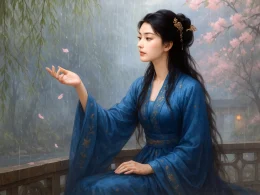I’ve left you for a thousand miles to stay
And write to you, tired, on the waters grey.
Though we live not the same life from day to day,
Can we not keep the separation away?
Three years have passed since I came to the west;
No message has come to me from the north.
Rosy cheeks must have faded, I guess;
The hair turned white cannot be blackened, alas!
A traveler coming from the capital
Has brought a letter written by you.
The mountains and streams separate us far,
But two minds made one will not drift apart.
Original Poem
「秋浦寄内」
李白
我今寻阳去,辞家千里馀。
结荷倦水宿,却寄大雷书。
虽不同辛苦,怆离各自居。
我自入秋浦,三年北信疏。
红颜愁落尽,白发不能除。
有客自梁苑,手携五色鱼。
开鱼得锦字,归问我何如。
江山虽道阻,意合不为殊。
Interpretation
Composed in the autumn-winter of 755 CE during Li Bai's stay in Qiupu (modern Chizhou, Anhui), this epistolary poem was written to his wife Zong Shi. As the An Lushan Rebellion loomed, Li Bai faced political disgrace following his involvement with Prince Li Lin's campaign, plunging him into his most destitute and rootless period. More than a mere letter, the poem reveals a solitary soul's profound yearning for emotional anchorage amidst turmoil, blending personal sorrow, historical tragedy, and marital devotion.
First Couplet: "我今寻阳去,辞家千里馀。"
Wǒ jīn Xúnyáng qù, cí jiā qiānlǐ yú.
I depart now from Xunyang, A thousand miles from home I roam.
The opening couplet's apparent simplicity belies intense emotional tension. "Depart from home" encapsulates the weariness of repeated journeys. Now in his fifties, Li Bai conveys through "a thousand miles" not just physical distance but also the psychological anguish of yearning for stability denied by fate.
Second Couplet: "结荷倦水宿,却寄大雷书。"
Jié hé juàn shuǐ sù, què jì Dàléi shū.
Moored by lotuses, tired of water-bound nights; Yet I write this letter to Dalei.
"Moored by lotuses" paints an elegant yet bleak travel scene where natural beauty contrasts with the traveler's exhaustion. "Tired" reflects both physical and spiritual fatigue, while "yet I write" reveals letter-writing as his crucial emotional outlet amidst hardship.
Third Couplet: "虽不同辛苦,怆离各自居。"
Suī bùtóng xīnkǔ, chuàng lí gèzì jū.
Though our hardships differ, In grief we live apart.
This demonstrates Li Bai's emotional depth. Rather than dwelling on his own suffering, he acknowledges his wife's solitary endurance. "Grief of separation" powerfully unites their fates, highlighting parting itself as a shared, profound anguish.
Fourth Couplet: "我自入秋浦,三年北信疏。"
Wǒ zì rù Qiūpǔ, sān nián běi xìn shū.
Since coming to Qiupu, three years have passed; Few letters came from the north.
"Three years" measures the duration of longing and isolation, while "few letters" reflects both wartime disruption and the endless worry bred by poor communication. This understatement proves more poignant than explicit lamentation.
Fifth Couplet: "红颜愁落尽,白发不能除。"
Hóngyán chóu luò jǐn, báifà bùnéng chú.
Your youthful beauty fades with sorrow; My white hairs grow beyond removal.
The couplet's heartbreaking parallel imagery—"youthful beauty" versus "white hairs"—vividly depicts how time and separation ravage both partners. "Fades with sorrow" materializes intangible grief, while "beyond removal" conveys futile resistance against relentless destiny.
Sixth Couplet: "有客自梁苑,手携五色鱼。"
Yǒu kè zì Liángyuàn, shǒu xié wǔ sè yú.
A guest arrives from Liangyuan, Bearing five-colored fish.
Here the poem turns. "Five-colored fish" alludes elegantly to the folk ballad trope of fish carrying letters, its poetic imagery bringing a ray of hope into the bleak narrative.
Seventh Couplet: "开鱼得锦字,归问我何如。"
Kāi yú dé jǐn zì, guī wèn wǒ rúhé.
Opening the fish, I find brocade words; 'How have you been?' you ask.
"Brocade words" subtly references Su Hui's palindrome poem, praising the wife's literary grace and devotion. The simple question "How have you been?" becomes immensely powerful, cutting through worldly complexities to offer pure, essential concern that touches the poet's deepest heart.
Eighth Couplet: "江山虽道阻,意合不为殊。"
Jiāngshān suī dào zǔ, yìhé bù wéi shū.
Though rivers and hills block our path, Our shared heart needs no bridge.
The conclusion elevates the poem from despair to affirmation. This is both a response to his wife's devotion and a solemn vow. "Blocked paths" represent harsh reality, while "shared heart" embodies warm, powerful spiritual connection, transforming personal grief into timeless emotional faith.
Holistic Appreciation
This poem stands among Li Bai's most sincere and profound works, shedding his usual boldness to reveal a husband's and wanderer's essential emotions. Moving from parting to travel-weariness, to longing, to consolation via letters, and finally to steadfast love, the poem progresses through emotional waves that feel both authentic and stirring. Blending personal rootlessness with marital devotion, its plain language conveys soul-stirring power. More than a private letter, it captures the gaze of all classical-era wandering souls toward emotional refuge.
Artistic Merits
- Sincere Language, Profound Emotion: Eschewing ornate diction, the poem uses simple, conversational language that achieves an "authenticity beyond ornamentation" aesthetic.
- Blended Realities, Interwoven Time-Space: Skillfully interweaving the present "I" with the imagined "you," while juxtaposing "three years" of duration with "a thousand miles" of distance, the poem expands its emotional capacity.
- Natural Allusions, Rich Connotations: Allusions like "five-colored fish" and "brocade words" are seamlessly integrated, adding elegance and depth without obscuring feeling.
- Dynamic Emotion, Tight Structure: The poem moves from melancholic depression to consoled elevation, with the concluding vow echoing the opening departure to form a complete emotional cycle.
Insights
Through its millennial journey, this work preserves the living heat of human connection. It affirms that familial love provides an unshakeable foundation through all historical upheavals and personal trials. When Li Bai encountered impassable geographical and existential barriers, it was the conviction of "united hearts" that provided his mooring. This illuminates a fundamental truth: nurturing authentic relationships constitutes our most meaningful response to life's inherent transience and challenges.
About the poet

Li Bai (李白), 701 - 762 A.D., whose ancestral home was in Gansu, was preceded by Li Guang, a general of the Han Dynasty. Tang poetry is one of the brightest constellations in the history of Chinese literature, and one of the brightest stars is Li Bai.












